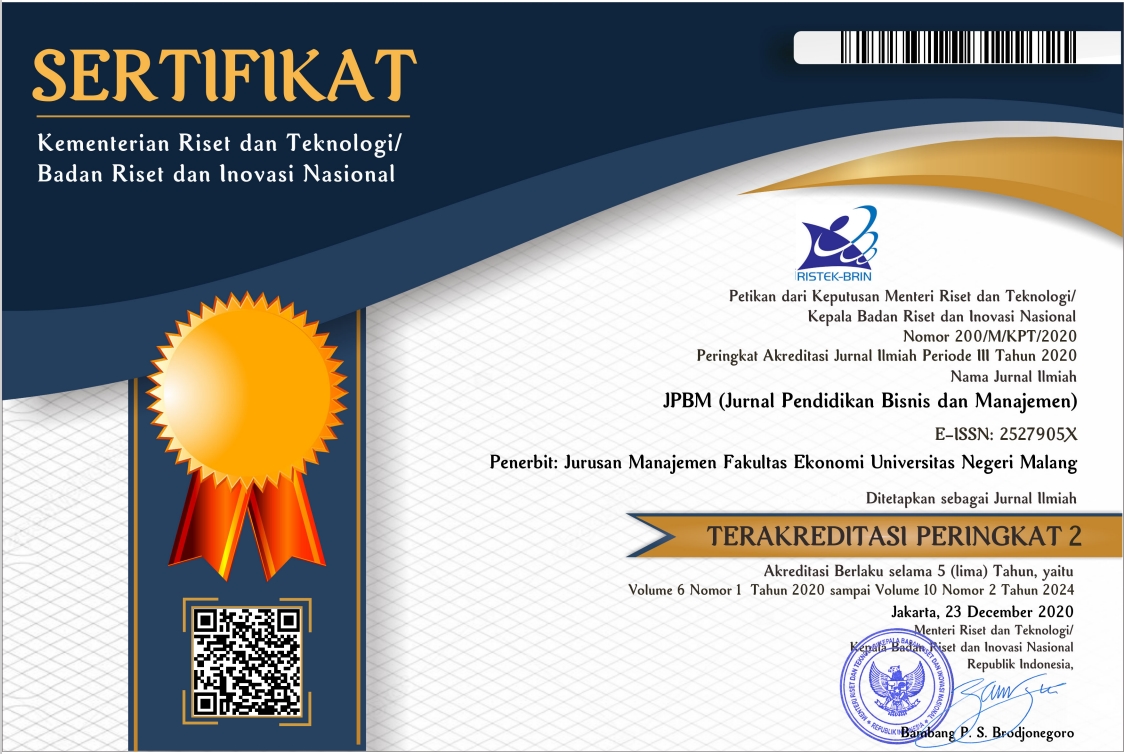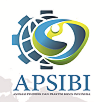Learning Goal Orientation, Innovative Work Behavior, and Entrepreneurship Training on Human Resources Development
Abstract
Entrepreneurship training that has been provided continues to cause problems in developing human resources for Indonesian migrant workers. The unique character of Indonesian migrant workers who were initially employees who turned into business owners is interesting to research in relation to human resource development. Thus, this study aims to analyze the linkage between human resource development through the variables entrepreneurship training, innovative work behavior, and learning goal orientation. This study used questionnaire-based surveys with certain criteria and involved structural equation modeling (SEM) methods based on partial least squares (PLS). The data were collected from 354 Indonesian migrant workers who were involved in small-medium enterprises. The findings indicate that there is a positive relationship between entrepreneurship training and innovative work behavior. This study also shows that learning goal orientation moderates the influence of entrepreneurship training on innovative work behavior.
Keywords: Entrepreneurship training, Innovative work behavior, Learning goal orientation, Human resources development
Full Text:
PDFReferences
Aboobaker (2020). Human capital and entrepreneurial intentions: do entrepreneurship education and training provided by universities add value?. Horizon, 28(2), 73–83. https://doi.org/10.1108/OTH-11-2019-0077
Alessa, H. S., & Durugbo, C. M. (2022). Systematic review of innovative work behavior concepts and contributions. Management Review Quarterly, 72(4), 1. https://doi.org/10.1007/s11301-021-00224-x
Al-Omari, M. A., Choo, L. S., & Ali, M. A. M. (2019). Innovative work behavior: A review of literature. International Journal of Psychosocial Rehabilitation, 23(2), 12. https://doi.org/10.37200/IJPR/V23I2/PR190268
Bonnario, M. (2021). Human resource training and planning for work productivity of employees ministry of coordinating ministry of human development and culture. Eduvest-Journal of Universal Studies, 1(9), 961–969. https://doi.org/10.36418/edv.v1i9.205
Fabiano, B., Pettinato, M., Currò, F., & Reverberi, A. P. (2022). A field study on human factor and safety performances in a downstream oil industry. Safety Science, 153, 25. https://doi.org/10.1016/j.ssci.2022.105795.
De Jong, J., & Den Hartog, D. (2010). Measuring innovative work behaviour. Creativity and Innovation Management, 19(1), 23–36. https://doi.org/10.1111/j.1467-8691.2010.00547.x
Gardiner, P., Leat, M., & Sadler-Smith, E. (2001). Learning in organizations: HR implications and considerations. Human Resource Development International, 4(3), 391–405. https://doi.org/10.1080/13678860126433
Khan, M. A., Ismail, F. B., Hussain, A., & Alghazali, B. (2020). The Interplay of Leadership Styles, Innovative Work Behavior, Organizational Culture, and Organizational Citizenship Behavior. SAGE Open, 10(1), 215824401989826. https://doi.org/10.1177/2158244019898264
Kim, D., & Lee, D. (2018). Impacts of metacognition on innovative behaviors: Focus on the mediating effects of entrepreneurship. Journal of Open Innovation: Technology, Market, and Complexity, 4(2). https://doi.org/10.3390/joitmc4020018
Kim, S. (2007). Learning goal orientation, formal mentoring, and leadership competence in HRD. Journal of European Industrial Training, 31(3), 181–194. https://doi.org/10.1108/03090590710739269
Li, W., Gill, S. A., Wang, Y., Safdar, M. A., & Sheikh, M. R. (2022). Proactive personality and innovative work behavior: Through the Juxtapose of Schumpeter’s theory of innovation and broaden-and-build theory. Frontiers in Psychology, 13(June), 1–17. https://doi.org/10.3389/fpsyg.2022.927458
Makhsousi, A., Sadaghiani, J. S., & Amiri, M. (2014). Effects of training methods on human resource productivity in Mellat Bank. International Review of Management Aand Business Research, 3(3), 1345
McCormick, B. W., Guay, R. P ., Colbert, A. E., & Stewart, G. L. (2019). Proactive personality and proactive behaviour: Perspectives on person–situation interactions. Journal of Occupational and Organizational Psychology, 92(1), 30–51. https://doi.org/10.1111/joop.12234
Mehale, K. D., Govender, C. M., & Mabaso, C. M. (2021). Maximising training evaluation for employee performance improvement. SA Journal of Human Resource Management, 19, 1–11. https://doi.org/10.4102/sajhrm.v19i0.1473
Minja, J., & Mbura, O. (2019). Conceptualizing transfer of entrepreneurship training: A theme for human resource development (HRD). 19th International Conference on African Entrepreneurship & Small Business (ICAESB 2019), (ICAESB Proceedings-2019), 194–216. https://udsm.ac.tz//upload/20200623_080854_icaesb_2019.pdf%0A
Mubarak, N., Khan, J., Yasmin, R., & Osmadi, A. (2021). The impact of a proactive personality on innovative work behavior: the role of work engagement and transformational leadership. Leadership and Organization Development Journal, 42(7), 989–1003. https://doi.org/10.1108/LODJ-11-2020-0518
Mutmainnah, D., Yuniarsih, T., Disman, Sojanah, J., Rahayu, M., & Nusannas, I. S. (2022). The impact of directive leadership on innovative work behavior: the mediation role of continuance commitment. Journal of Indonesian Economy and Business, 37(3), 28. https://doi.org/10.22146/jieb.v37i3.3377
Noor, A. N. M., Khalid, S. A., Nor, M. N. M., Ahmad, Z., Fuad, N., & Abdullah, N. A. N. (2017). Relationship Between High-Involvement Human Resource Practices and Innovative Work Behavior. Advanced Science Letters, 23(8), 7505–7507. https://doi.org/10.1166/asl.2017.9509
Odoardi, C., Cangialosi, N., & Battistelli, A. (2022). HR training practices and innovative work behaviour: a moderated mediation model. International Journal of Human Resources Development and Management, 22(1/2), 1. https://doi.org/10.1504/IJHRDM.2022.121320
Ozkeser, B. (2019). Impact of training on employee motivation in human resources management. Procedia Computer Science, 158, 802–810. https://doi.org/10.1016/j.procs.2019.09.117
Plomp, J., Tims, M., Akkermans, J., Khapova, S. N., Jansen, P. G. W., & Bakker, A. B. (2016). Career competencies and job crafting. Career Development International, 21(6), 587–602. https://doi.org/10.1108/CDI-08-2016-0145.
Rajah, N., & Aris, A. (2018). The role of Human Resource Development in the relationship between Intrapreneurial Competencies and Innovative Work Behaviour: A Case Study. Herald NAMSCA, 4. Rodhiah, R., & Nur Hidayah. (2022). Sustainable Development Innovation “The Effect of Flexible HRM Behavior on SME Innovation.” Economit Journal: Scientific Journal of Accountancy, Management and Finance, 1(4). https://doi.org/10.33258/economit.v1i4.589
Saidi, A., & Habibi, M. (2022). Descriptive analysis of human resource development through motivation and training as well as supporting and inhibiting factors. Daengku: Journal of Humanities and Social Sciences Innovation, 2(4), 549–558. https://doi.org/10.35877/454ri.daengku1107
Sari, F. A., & Amalia, L. (2022). Effectiveness of training methodology on innovative work behavior and government employee performance during the Covid-19 pandemic: The role of soft skill and emotional intelligence. Jurnal Manajemen Teori Dan Terapan | Journal of Theory and Applied Management, 15(1). https://doi.org/10.20473/jmtt.v15i1.31486
Shipton, H., West, M. A., Dawson, J., Birdi, K., & Patterson, M. (2006). HRM as a predictor of innovation. Human Resource Management Journal, 16(1), 3–27. https://doi.org/10.1111/j.1748-8583.2006.00002.x
Stan, D. S., Gyes, G. Van, & Hootegem, G. Van. (2014). The innovative work behaviour concept: definition and orientation. Gedrag & Organisatie, 27(2).
Strobel, M., Tumasjan, A., Spörrle, M., & Welpe, I. M. (2017). Fostering employees’ proactive strategic engagement: Individual and contextual antecedents. Human Resource Management Journal, 27(1), 113–132. https://doi.org/10.1111/1748-8583.12134
Tudor, L. S., Langa, C., Bulgaru, I., & Lazar, A. N. (2020). Study on the development of entrepreneurial culture in the university environment. 2020 12th International Conference on Electronics, Computers and Artificial Intelligence (ECAI), 1–4. https://doi.org/10.1109/ECAI50035.2020.9223153
Winarno, A., Prasetio, A. P., Luturlean, B. S., & Wardhani, S. K. (2022). The link between perceived human resource practices, perceived organisational support and employee engagement: A mediation model for turnover intention. SA Journal of Human Resource Management, 20, 1082. https://doi.org/10.4102/sajhrm.v20i0.1802
Yoon, S. W., & Park, J. G. (2023). Employee’s intention to share knowledge: the impacts of learning organization culture and learning goal orientation. International Journal of Manpower, 44(2), 231–246. https://doi.org/10.1108/IJM-01-2021-0004
DOI: http://dx.doi.org/10.17977/um003v10i12024p016
Refbacks
- There are currently no refbacks.
JPBM (Jurnal Pendidikan dan Bisnis Manajemen) is licensed under a Creative Commons Attribution-NonCommercial-ShareAlike 4.0 International License.
JPBM (Jurnal Pendidikan dan Bisnis Manajemen) is abstracted and indexed in :
















